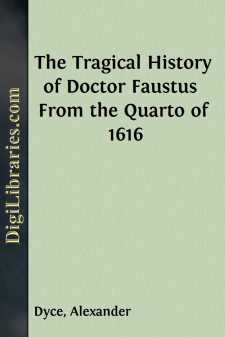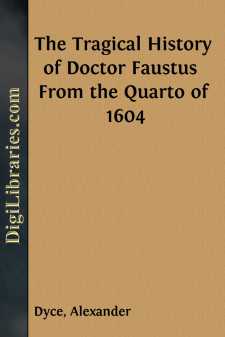Categories
- Antiques & Collectibles 13
- Architecture 36
- Art 48
- Bibles 22
- Biography & Autobiography 813
- Body, Mind & Spirit 142
- Business & Economics 28
- Children's Books 15
- Children's Fiction 12
- Computers 4
- Cooking 94
- Crafts & Hobbies 4
- Drama 346
- Education 46
- Family & Relationships 57
- Fiction 11829
- Games 19
- Gardening 17
- Health & Fitness 34
- History 1377
- House & Home 1
- Humor 147
- Juvenile Fiction 1873
- Juvenile Nonfiction 202
- Language Arts & Disciplines 88
- Law 16
- Literary Collections 686
- Literary Criticism 179
- Mathematics 13
- Medical 41
- Music 40
- Nature 179
- Non-Classifiable 1768
- Performing Arts 7
- Periodicals 1453
- Philosophy 64
- Photography 2
- Poetry 896
- Political Science 203
- Psychology 42
- Reference 154
- Religion 513
- Science 126
- Self-Help 84
- Social Science 81
- Sports & Recreation 34
- Study Aids 3
- Technology & Engineering 59
- Transportation 23
- Travel 463
- True Crime 29
The Tragical History of Doctor Faustus From the Quarto of 1616
by: Alexander Dyce
Publisher:
DigiLibraries.com
ISBN:
N/A
Language:
English
Published:
1 year ago
Downloads:
16
Categories:
*You are licensed to use downloaded books strictly for personal use. Duplication of the material is prohibited unless you have received explicit permission from the author or publisher. You may not plagiarize, redistribute, translate, host on other websites, or sell the downloaded content.
Description:
Excerpt
THE TRAGICAL HISTORY OF DOCTOR FAUSTUS
FROM THE QUARTO OF 1616.
Enter CHORUS.
CHORUS. Not marching in the fields of Thrasymene,
Where Mars did mate the warlike Carthagens;
Nor sporting in the dalliance of love,
In courts of kings where state is overturn'd;
Nor in the pomp of proud audacious deeds,
Intends our Muse to vaunt her heavenly verse:
Only this, gentles,—we must now perform
The form of Faustus' fortunes, good or bad:
And now to patient judgments we appeal,
And speak for Faustus in his infancy.
Now is he born of parents base of stock,
In Germany, within a town call'd Rhodes:
At riper years, to Wittenberg he went,
Whereas his kinsmen chiefly brought him up.
So much he profits in divinity,
That shortly he was grac'd with doctor's name,
Excelling all, and sweetly can dispute
In th' heavenly matters of theology;
Till swoln with cunning, of a self-conceit,
His waxen wings did mount above his reach,
And, melting, heavens conspir'd his overthrow;
For, falling to a devilish exercise,
And glutted now with learning's golden gifts,
He surfeits upon cursed necromancy;
Nothing so sweet as magic is to him,
Which he prefers before his chiefest bliss:
And this the man that in his study sits.
[Exit.]
FAUSTUS discovered in his study.
FAUSTUS. Settle thy studies, Faustus, and begin
To sound the depth of that thou wilt profess:
Having commenc'd, be a divine in show,
Yet level at the end of every art,
And live and die in Aristotle's works.
Sweet Analytics, 'tis thou hast ravish'd me!
Bene disserere est finis logices.
Is, to dispute well, logic's chiefest end?
Affords this art no greater miracle?
Then read no more; thou hast attain'd that end:
A greater subject fitteth Faustus' wit:
Bid Economy farewell, and Galen come:
Be a physician, Faustus; heap up gold,
And be eterniz'd for some wondrous cure:
Summum bonum medicinoe sanitas,
The end of physic is our body's health.
Why, Faustus, hast thou not attain'd that end?
Are not thy bills hung up as monuments,
Whereby whole cities have escap'd the plague,
And thousand desperate maladies been cur'd?
Yet art thou still but Faustus, and a man.
Couldst thou make men to live eternally,
Or, being dead, raise them to life again,
Then this profession were to be esteem'd.
Physic, farewell! Where is Justinian?
[Reads.]
Si una eademque res legatur duobus, alter rem,
alter valorem rei, &c.
A petty case of paltry legacies!
[Reads.]
Exhoereditare filium non potest pater, nisi, &c.
Such is the subject of the institute,
And universal body of the law:
This study fits a mercenary drudge,
Who aims at nothing but external trash;
Too servile and illiberal for me.
When all is done, divinity is best:
Jerome's Bible, Faustus; view it well.
[Reads.]
Stipendium peccati mors est.
Ha!
Stipendium, &c.
The reward of sin is death: that's hard.
[Reads.]
Si peccasse negamus, fallimur, et nulla est in nobis veritas;
If we say that we have no sin, we deceive ourselves, and there
is no truth in us. Why, then, belike we must sin, and so
consequently die:
Ay, we must die an everlasting death....




